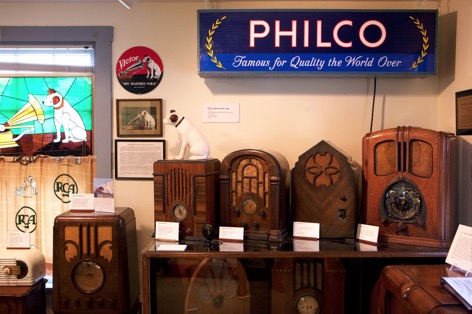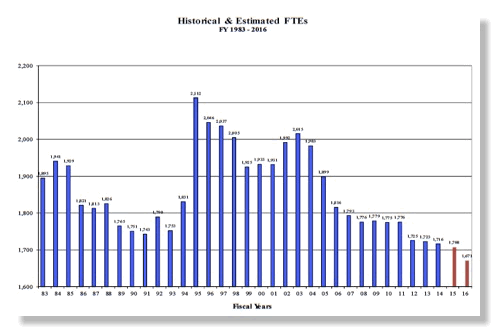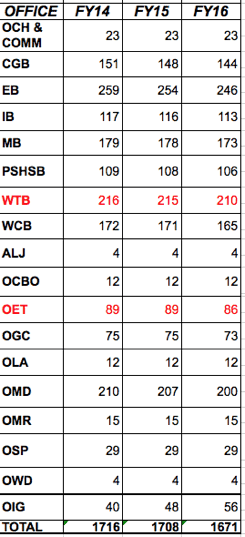NAB and the FM in Cellphone Issue: The Disappearance of Radios

The National Capital Radio and Television Museum in Bowie, Md., is home to radios dating back to the 1920s
Photo from NPR.
Today is World Radio Day, a joint venture of ITU and UNESCO. UNESCO says
World Radio Day is about celebrating radio, why we love it and why we need it today more than ever. A day to remember the unique power of radio to touch lives and bring people together across every corner of the globe. Join the celebration!…Radio is a medium for the future. It has a duty to include young people, not just as listeners but as active producers and creators of content…In conflict and disaster zones, young international freelancers and local fixers contribute invaluably to the pursuit of information. They deserve to work in safety and security. Find out what can be done.
To celebrate this event, NPR had a piece this morning on “Finding A 'Radio That Is Just A Radio' In The Digital Age”. They sent their intrepid reporter out to buy “just a radio” - by which they meant a battery powered radio with a speaker but without a CD player, internet connection, etc. Good news is they found a convenient source even though the big box stores had nothing. Bad news is that source was Radio Shack! (However, they found alternatives available over the net.)
But this got me thinking about NAB’s past efforts in promoting HDRadio and in a statutory mandate for cell phones to include FM receivers. Earlier NAB blamed FCC for the failure of AM stereo since FCC did not immediately agree with NAB’s view of picking a technical standard. Of course, they conveniently ignore that AM stereo fizzled in other countries where the regulators kowtowed to the broadcasters and promptly picked a single standard. Just because we can build technology X does not necessarily mean that consumers want technology X.
So NAB Labs continues to discuss the availability of FM receive capability in smartphones, NAB provides a website radiorocksmyphone.com with this viewpoint:
Now, many Americans are demanding a FREE entertainment option as a feature on their smartphones – local radio! It's been around for decades, but it's better than ever – more music, more news, more choices than ever before. And best of all, it doesn't require a broadband connection or eat up your data plan.
The site has a list of “Radio Ready Cell Phones”: mostly from HTC, with a refurbished Blackberry, an Alcatel model, 2 models from LG and 3 from Samsung. (The list was last updated in June 2014 so maybe NAB isn’t taking this too seriously.)
I like radio, but I am a baby boomer not a “millennial”. Heck, I even have a ham radio license! I support NPR with donations and listening. But the way to keep radio from fading away is not to force consumers to buy a product they clearly are losing interest in; the way to preserve it is to have it carry content that people really want.
Delegated Authority @ FCC
I agree that "fixing the delegation process should be a priority for the Commission". As one who worked at FCC for almost 25 years I can see the problems. However, if not done with care to address the real problems the net effect will be to decrease FCC productivity to the detriment of all regulated entities.
Section 5(c) gives the Commission broad authority to delegate. In the early days of the Commission the (then) 7 commissioner divided themselves into 3 "divisions" that could act independently in the 3 important areas of the time: telephone, telegraph, and broadcasting. This was in an era where radio technology regulation was much simpler. The maximum usable frequency was 2 MHz. The only modulations available were AM and Morse code. There was no APA so adopting rules was much simpler.
All this changed post WWII with a huge explosion of radio technology resulting from wartime R&D coupled with the new APA which made adopting rules more complex. The nearly 70 years of court decisions on the APA have made updating rules even more difficult - a real problem with technical radio rules where a new technology often requires a rule change.
Does today's FCC have the decision productivity to keep up with its Title III technical role today? Probably not.
New wireless technologies are not being addressed in a timely way. Consider the record of RM-11664 (an issue I was not involved in) that is mentioned parenthetically in the Docket 14-177 NOI. This October 2012 proposal for a trade group was neither dismissed nor acted on for over 2 years. Consider the Docket 09-157 NOI on "wireless innovation", launched with great fanfare and now waiting silently to become "stale" and be dismissed with hundreds of other pending proceedings. Mitch Lazarus, an attorney who was known for representing many wireless technology innovators before he retired recently, documented delays of new technology considerations in his Docket 09-157 pro se comments:
http://apps.fcc.gov/ecfs/document/view?id=7020039921
http://apps.fcc.gov/ecfs/document/view?id=7020039922
The delays in technical spectrum issues affects not only new technologies, they also affect "emerging interference" issues of new types of interference to incumbents that need a new policy decision to resolve. For example:
- Police radar detector interference to VSAT/Docket 01-278: While the NPRM implies that this issue was addressed quickly, in reality the FCC staff was aware of the problem for a decade before action
- Cellular booster to cellular base station interference/Docket 10-4: From the first documented pleas from CTIA for "urgent action" to R&O this issue took almost a decade to resolve.
- The ongoing FM broadcast harmonic interference to 700 MHz LTE base station interference: A rule conflict prevents assigning responsibility to one side or the other and the issue has been pending at the staff level for 2 years. (Is the 8th Floor even aware of it?)
The inability of the Commission to resolve these new policy issue interference cases in a timely way threatens all incumbents and makes a mockery of the often repeated claim that if a decision results in unexpected interference it will be addressed quickly. It also raises doubt about the FCC being the "expert agency in spectrum management". The current FCC backlog in Title III technical issues prevents timely resolution of most issues.
While incentive auctions and corporate mergers are getting attention, many Title III issues dealing with either interference issues needing a rulemaking decision or enabling new technologies that would improve US competitiveness are just gathering dust.
Note that the Commission's UK counterpart, Ofcom, has a "Board" that is both its "main decision making body" and "provides strategic direction for the organisation". The board is composed of individuals with backgrounds comparable to FCC commissioners and are appointed by the UK's political process. But unlike at FCC, the Ofcom Board does not have to approve every obscure decision, they focus more on the big issues and setting policy for the Chief Executive who works for them and controls the bulk of decisions.
Most of us think Ofcom does a better job keeping up with its work load than FCC does. But while Ofcom is staffed with "British civil servants"* who are politically neutral, for decades FCC staff has had significant "noncareer" leadership both in positions formally designated as noncareer and in career positions filled with de facto political appointments. While Bob Pepper loyally served chairmen of both parties in the former Office of Plans and Policy, that type of nonpartisan leadership of a bureau/office has been rare in the past few decades. This in turn leads to a leadership "blood bath" of senior managers with a change in the White House and sometimes even a change in chairman under the same President. This inevitably results in Commission staffers having mixed loyalty to the agency and the chairman. The agency should try to get more nonpartisan "Bob Peppers" in senior management slots in the bureaus/offices to give the staff more stability.
The problems of timeliness of decisions might have gotten more attention if the FCC's Inspector General devoted more resources to his role of independent review of the Commission's operations rather than getting totally distracted by his role in USF fraud cases. While the IG is not appointed by the President and confirmed by the Senate like cabinet level IGs, the statute is quite clear that his responsibilities are the same. Other IGs give feedback on the "big picture" in their agency, e.g. NRC IG report on FOIA problems at NRC, but FCC's IG doesn't. While the current IG is not a crony of the chairman like all of his predecessors were, the pattern of not looking at big problems in FCC was well established before he arrived. A credible and independent FCC IG would make FCC more credible!
Under the terms of Section 5(c) of the Act, the Commission could act more like Ofcom if it chose to. Perhaps it would need more resources, but I suspect an objective analysis of the economic cost of present delays in both new technology deliberations and emerging interference resolution time would show that new resources to improve decision times in these matters would be cost-effective for the economy.
The Commission could thus focus more on defining overall policies and strategies to give guidance to its staff as well as reserving for itself the most major issues. Any staff decision could be appealed, as now, under the terms of Section 5(c)(4).
The delegation of authority issue should be reviewed, but a major focus should be on BOTH improving productivity and throughput of the agency as well as improving accountability of the staff to the will and authority of the commissioners. SOME decisions really need the input and "hands on: vote of presidential appointees. Many do not and the present processes slow resolution of Title III technical issues to the detriment of all involved. It is important to have better process to decide which issues got to a vote on the 8th Floor and which can be resolved faster through delegated authority. It is also important that the staff have better guidance from the Commission or goals and strategies to be used in resolving issues on delegated authority. But routing everything through the 8th Floor is likely to slow key Title III technical decisions even more.
* Ofcom is actually not a normal UK agency and their staff are not legally the same as mainstream civil servants, but they are apolitical.
Observations on FCC FY16 Budget

This week the President released the proposed FY2016 Budget of the US and most agencies simultaneously released their proposed budget - actually their original proposal as modified by OMB in a multi month off the record process in parallel with all other agencies’ budgets. (FCC may be an “independent agency” in many respects, but in budget matters it is treated as a member of the Executive Branch.) As usual, FCC posted it in an obscure place on its website without public announcement. However, a few days later for the first time in the history of the FCC website it showed up in the rotating headlines in the upper left corner of the FCC’s homepage. Here is a link to the FCC’s FY16 Budget Proposal to Congress.

Note also that that the WTB/OET team is actually a profit center for the US Government as the recent auction results show. Yet both are drifting down in size. Some might say attrition. So while FCC faces real backlogs with dealing with new technology issues such as millimeter waves that threaten US technical leadership and also with resolving interference issues that need policy decisions that threaten the operation of incumbent licensees, the staff working on these issues will actually decrease.
What is increasing? As can be seen in the next to last line of the table, the FCC’s Inspector General’s staff is increasing from 40 to 48 to 56! The justification fro this is to fight Universal Service Fund fraud. When AT&T was a monolithic near monopolist it was agreed between them , FCC, and Congress that they would transfer money around within AT&T to subsidize rural local telephone rates with income from long distance calls. This worked well until divestiture in 1984. USF was the replacement mechanism for the old money flows internal to the old AT&T. Billions of dollars flow through the USF from our phone bills and fraud is inevitable as FCC seeks to encourage new technology with the program. So there is nothing wrong with increasing attention to such fraud and it is actually cost-effective for the tatx payer to reduce the fraud.
But, as we have pointed out previously and repeatedly, despite the good and important work OIG does on USF fraud, that is not the whole job of that office under the terms of the Inspector General Act. Until the current IG, all the previous ones were cronies of the Chairman and long term FCC staffers. They did not want to find unpleasant things that would reflect poorly on their patron. Even though the current IG is unlike his predecessor in background, he seems to follow the office tradition he inherited of not asking questions about how well FCC is run. Other agency IGs do and their statutory charter is exactly the same. So if the FCC IG gets 56 FTE in FY16 will he break with the past and use some of this for the matters he and his predecessors have been carefully avoiding in the past?





![Validate my RSS feed [Valid RSS]](valid-rss-rogers.png)

